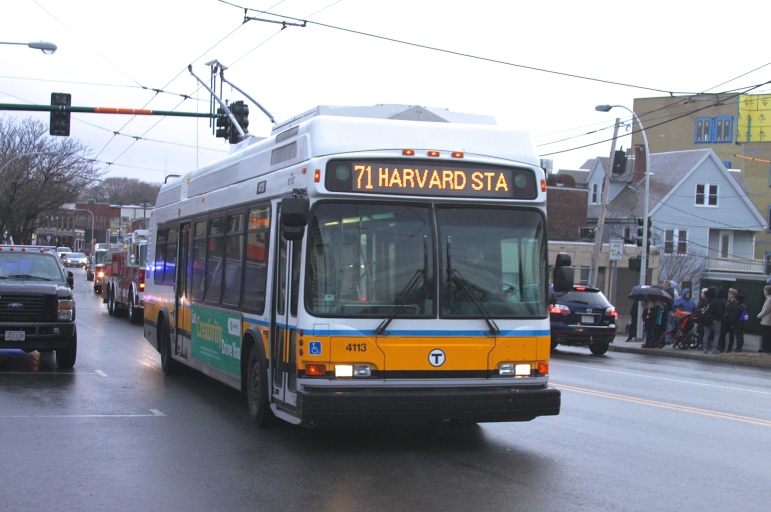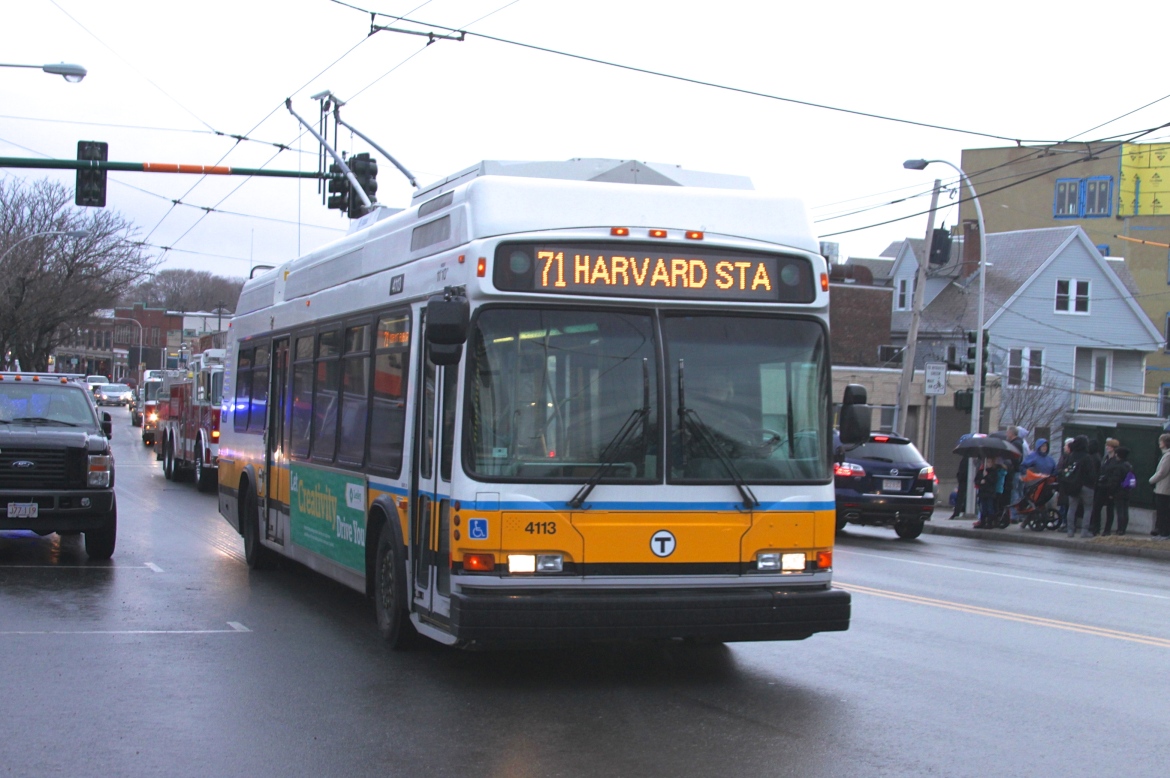
Charlie Breitrose
The Mt. Auburn Street Bus Priority Plan will try to improve service for the 71 and 71 buses in Watertown and Cambridge.
A meeting will be held to discuss the next steps for the Mt. Auburn Street Bus Priority Pilot that will include bus-only lanes for the 71 and 73 buses on a stretch of the road that can also be used by emergency vehicles and shuttles.
Learn more about the project and the efforts to test Bus Rapid Transit on Mt. Auburn Street and Belmont Street at a meeting on Tuesday, March 27, 6-7:30 p.m at the Russell Youth Center, 680 Huron Avenue, Cambridge. Find out more about the meeting here. The meeting will focus more on issues in Cambridge. The Town of Watertown will host a meeting on May 1, with the time and place to be announced.
Bus Priority Pilot
The following information was provided by the City of Cambridge:
The Town of Watertown and City of Cambridge have received a community grant from the Barr Foundation to work with the Institute for Transportation and Development Policy (ITDP) to pilot bus priority improvements for routes 71 and 73 along Mt. Auburn Street, between Belmont Street and Fresh Pond Parkway and for short segments of Belmont Street in Cambridge and Mt. Auburn Street in Watertown.
The demonstration project will include the first dedicated bus lanes in Cambridge and new bike lanes where possible, as well as transit signal priority. It will use temporary materials like paint and signs, which will remain in place during the evaluation, and is the first step towards implementing a long-term plan for the Mt. Auburn corridor. The pilot will take place in conjunction with planned Department of Conservation and Recreation (DCR) improvements to intersections at Coolidge Ave and Fresh Pond Parkway.
This pilot will improve travel for more than 12,000 daily MBTA bus riders, as well as for riders of Mount Auburn Hospital and athenahealth shuttles, while improving the flow of traffic and safety for everyone on the road.
Mt. Auburn Bus Priority Fact Sheet
The City of Cambridge, the Town of Watertown, and the Massachusetts Bay Transportation Authority (MBTA) are collaborating on a bus priority pilot funded by a grant from the Barr Foundation. The pilot will include elements of Bus Rapid Transit (BRT) on Mount Auburn Street west of Fresh Pond Parkway, serving the MBTA Routes 71 and 73, as well as shuttles and emergency vehicles, and will remain in place during evaluation and improvements, informing any longer-term design for the corridor.
What is the Route 71 & 73 bus priority pilot?
The pilot will test certain features of Bus Rapid Transit (BRT) on MBTA bus routes 71 and 73. It will use painted bus-only lanes, signage, and signal changes to create a faster and more reliable service for more than 12,000 daily bus riders, as well as for riders of Mount Auburn Hospital and athenahealth shuttles, while improving the flow of traffic for everyone on the roads. In the morning peak commute time, more people are on the 71 and 73 combined than in cars on some parts of the corridor — with the potential for that number to grow with a more efficient and convenient bus system. The pilot will remain in place during evaluation and refinement of a final design.
What bus priority features does the pilot include?
DEDICATED BUS LANES to take bus riders out of car congestion for significant segments of Mount Auburn Street between Belmont Street and Fresh Pond Parkway. Other cities that have tested dedicated lanes have found that they result in more reliable trips for people riding the bus – as well as overall improved traffic flow for people in cars and on bikes – because buses no longer pull in and out of traffic. These lanes will also be available to Mount Auburn Hospital and athenahealth shuttles, as well as emergency vehicles.
INBOUND “QUEUE JUMP” LANES to give buses and shuttles priority in intersections on Mount Auburn Street and Belmont Street near where they meet so that buses can proceed directly into the dedicated bus late on Mt. Auburn, opposite Star Market.
RE-TIMED TRAFFIC SIGNALS AND TRANSIT SIGNAL PRIORITY to be implemented where feasible so that buses get more green light time when needed but also to improve traffic flow overall.
What happens during the pilot?
The pilot is the first step towards implementing a long-term plan for the corridor, which will also include the State’s Department of Conservation and Recreation (DCR) improvements to intersections at Coolidge Avenue and Fresh Pond Parkway.
The bus pilot will begin with implementation of painted bus-only lanes, signage, and signal priority in June, accompanied by focused publicity and educational community outreach. Cambridge, Watertown, and the MBTA anticipate leaving the facilities in place while working with community members and local businesses to evaluate the pilot over the summer and determine whether any further adjustments are appropriate. Evaluation will continue into the fall.
Why perform a pilot?
A 2014 analysis of MBTA data showed that the Mount Auburn Street corridor is one of the worst locations for MBTA bus delay and unreliability. However, it is also one of the most popular routes for bus ridership: during morning rush hour, more than half of the people traveling on the corridor are MBTA bus riders and 12,000 people commute by bus on Mount Auburn Street every day.
The BRT features and improvements described were recommended in a study of the Mount Auburn Street corridor completed by the DCR. This pilot provides an opportunity to put bus priority measures in place, observe the results, make further changes as needed based on those results, and learn from the experience to inform continued long-term planning.
Vehicle Volumes vs. People Volumes on Mount Auburn Street Between Brattle Street and Collidge Avenue (Source: DCR Public Presentation, January 10, 2016, Slide 70) http://www.mass.gov/eea/agencies/dcr/conservation/planning-andresource-protection/projects/mount-auburn-street-corridor-study.html
How will travelers be affected?
The bus-only lanes and signal improvements will significantly cut the travel time for MBTA bus riders and the Mount Auburn Hospital and athenahealth shuttle riders that use the corridor every weekday, particularly during the morning rush hour. Even more importantly, it will make those travel times more predictable. The reduced commute time will encourage more people to use buses and shuttles, decreasing overall traffic. Ambulances, fire trucks, and other emergency vehicles will also be able to use the lanes. This pilot will coincide with improvements that the DCR is making to the Fresh Pond Parkway and Coolidge Ave. intersections, so that on average, everyone’s trip on this part of Mount Auburn Street should be a little quicker.
How will this benefit Cambridge & Watertown?
These improvements allow buses to get around and through traffic congestion more quickly. Bus priority makes bus transportation more reliable, efficient, and cost-effective, and is being adopted by cities around the world to carry millions of people each day. By encouraging more efficient and reliable bus transport, bus commuters will experience faster commutes, and commuters who currently utilize other modes will have greater incentive to take the bus.
Bus priority also helps us effectively plan for transportation in the future. A recent study shows that the Greater Boston region can expect growth of 430,000 new residents between the years 2010-2030.
Without thoughtful planning around our streets, our transportation system won’t keep pace with our needs, resulting in more traffic and making it harder for everyone to get to where they need to go. Previous local demonstrations in neighboring cities have shown that incorporating BRT elements into the MBTA system gives riders a more positive impression of their bus experience and has the potential to increase bus ridership—which is critical to decreasing car traffic, cutting greenhouse gases, and promoting complete streets.
What is the community process and timeline?
The City of Cambridge, the Town of Watertown, and the MBTA are committed to engaging with local community members and abutting businesses leading up to the pilot, as well as collecting data over the course of the pilot to evaluate its effectiveness. In addition to the internal meetings for municipal staff, the partners will host two community meetings, with exact dates to be announced, and seek feedback through community outreach and our digital channels.
• FEBRUARY 15 AT 6:30 – Mount Auburn Street Complete Streets Project – Discussion of Transit Issues and Technologies, Watertown Public Library
• MARCH 2018 – Cambridge neighborhood and business meetings
• APRIL 2018 – Cambridge/Watertown joint meeting with pilot plans
• MAY/ JUNE 2018– Pilot kickoff
• JUNE/ JULY 2018 – Initial Pilot evaluation • FALL 2018 – Design modifications and additional evaluation as needed
How can I learn more? For questions or feedback please email PILOT@BOSTONBRT.ORG
Follow along on Twitter @CAMBMA and #CAMBRIDGEBRT
